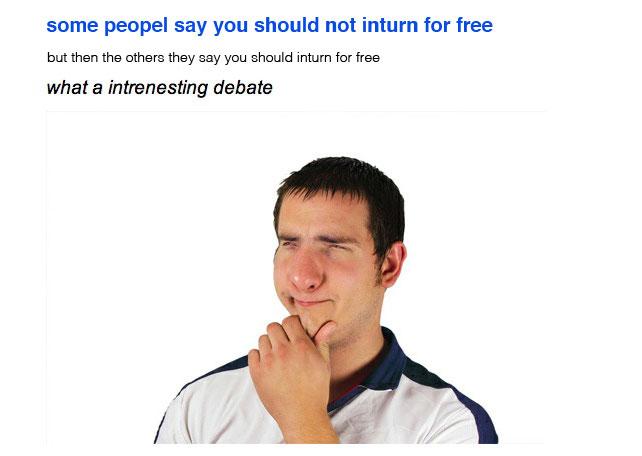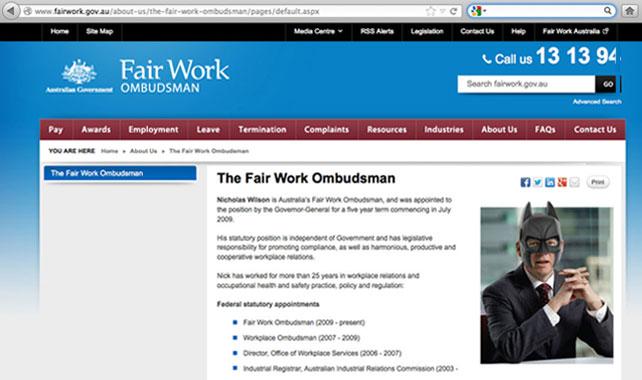
Two years ago our Editor wrote an article entitled ‘Are Internships a modern form of slavery?‘ which raised some super important points about unpaid work. At that time I was too busy doing my actual Internship to read words about internships, but FLASH FORWARD two years and they are a bigger part of my life now than when I was on the unpaid front line.
Throughout the course of day-to-day happenings on the Pedestrian Jobs site, I started noticing more and more companies pulling unpaid Internships out of their fanny-packs which in so many ways is so many kinds of excellent.
I personally remember having to use my stupid initiative to source out opportunities for work experience, so it’s great to have somewhere for people to easily find what’s out there; but we also got a few complaints on the ol’ Social Media channels. Some members of the community started expressing concern that certain entry-level jobs appeared to be getting replaced with unpaid ones.
Faceless community moderator that I may be, it was totally harshing my vibes to think about how harshed your vibes were getting, and so I started to resent internships. I started to hate their dumb faces. Which is weird because before that I had nothing but positive associations with the whole business. Then I thought about it, I puzzled it out like a big girl and it seems to me that we are all throwing around the term ‘Internship’ without really knowing what it really meant or what was even legal;

In prehistoric times young boys would shadow the elder hunters of the group, to learn the ins and outs of mammoth murdering – and thus the intern was born!
In the book ‘Intern Nation‘ author Ross Perlin charts the progression of internships from their first recorded beginnings (in late 19th Century medicine) to where they are today. Yeah, they started in medicine. (I made up the early-man bit.) FUN FACT ALERT: Apparently in the 1980s Disneyland got in touch with universities around the US inviting the students to come on as temporary unpaid workers to earn academic credits, which led to our modern form of unpaid placements!
So if there’s a question regarding internships where can you go for answers?
The Fair Work Ombudsman is a statutory dude appointed by the Fair Work Act 2009, his name is Nicholas Wilson and he operates independently of Government, making his own decisions about all investigations. I don’t throw around terms like “renegade”, “maverick” and “vigilante” lightly…but basically, he’s the hero that Australian Interns needed. A watchful protector, if you will;

However, Dark Knight* that he may be, there are limits to how closely Fair Work can regulate every single organisation in Australia. With this obviously weighing heavy on his mind, the Ombudsman commissioned two professors from Adelaide University to undertake a comprehensive research project on “Internships.”
I asked Professor Andrew Stewart, one half of the Ombudsmen’s dream team, to walk us through where they’re at so far. I also spoke to Amber Sharp, a partner at Marque Lawyers, to guide us through the legalities of internships in Australia. So they came on down and helped a brother out because believe it or not I R not a lawyer;

*I LIKE BATMAN
What are your rights and what is the actual difference between being an employee and an Intern?
Please, allow me to severely over-simplify a complicated issue by saying that if you are an Intern you DO NOT get paid, and if you are an employee you DO get paid. Let me now begin to potentially blow your mind and say that there is a chance that you are an employee without knowing it. RUH-ROH!
To determine whether or not you have an Employment Contract under Common Law (now you’re all like ‘woah! I thought this gal said she was NOT a lawyer’) you would need to look at the purpose of the arrangement, the length of time, your obligations in the workplace, who benefits from the arrangement, and whether the placement was entered into through a university or vocational training organisation program.
Part of the professors’ job for the Ombudsman is to help develop MUCH CLEARER guidelines that could indicate to people – both individuals and organisations – whether the type of arrangement that they are getting jiggy with is more or less likely to involve an employment relationship.
Right now, they’re not quite done yet (expect their report to drop sometime around October) but there are some things which you really should be aware of when it comes to slavery #INTERNSHIPS.
Baby where’d you get that Internship from?

VOCATIONAL PLACEMENTS.
Cards on the table…I had a pretty sweet ride when it came to interning. I did it whilst at uni, and luckily got an internship through a friend who already had one, helping out the AH.MAZING team who organise the Mardi Gras. I got to work alongside the Marketing Director, help write the parade program, learn a lot about large-scale events and just generally have a gay ol’ time.
I didn’t ever stop and think whether the unpaid work I was doing for the company was actually allowed. I have since found out through the course of my Googling and from sitting at the feet of those wiser than I that, from a legal perspective, doing something as a formal part of a University degree or training course is covered under ‘Vocational Placements’, which, under the Fair Work Act 2009, says that you can’t be an ’employee’ if you are undertaking an unpaid placement as a ‘requirement of an authorised education or training course’. This also means that you are not entitled to accept pay or other perks of being an employee – like being able to get rly hammered in after work situations and make a dik of yourself (in case you were not aware – NOT IDEAL TO GET RLY HAMMERED AND MAKE A DIK OF YOURSELF WHEN YOU ARE THE INTERN). If I had only known then what I know now…
Most education institutions such as TAFEs and Universities – the ones that are 2 LEGIT 2 QUIT – will ensure that whilst you are an intern your placement is well documented, well regulated and insured to high hell. So if you ARE doing a Vocational Placement or need to do one, you’re most likely going to be in gentle hands. They should be treating you like a lady, ya noe, making you feel safe…not unlike being womb-bound.
Professor Stewart and his off sider Professor Rosemary Owens have been looking to do some small-scale preliminary surveys to get some idea of how prevalent unpaid internship arrangements outside of formal study actually are. If they find that a lot of people are just walkin’ around being all unpaid without actually needing to as a uni requirement…legislation will most likely be nip’d/tuck’d accordingly to try and protect the unpaid masses. When we spoke to (the aforementioned) Amber Sharp she was quite insistent that the law is already pretty clear on this.
As it stands, there really isn’t a lot of room for unpaid internships. The circumstances where an organisation is not obliged to pay somebody for doing work are limited; it’s really only “okay” when you are undertaking a Vocational Placement.
Let’s have a safe word…
Now that we’ve got that out of the way the next question is: how do you know if the work you are doing as an intern is stuff that you’re allowed to do?
An intern who is getting a magical well-structured, carefully supervised training program – where employees are taking up their valuable Facebooking time to help provide instruction and impart them with ALL the knowledge – will most likely be an actual intern. HOWEVER! If (even if not in a sustained way) you’re essentially doing exactly the same kind of work that a paid employee is doing… we’re going to need a safe word, because things may have gotten out of hand.
When that is the case, the organisation has got a srs Nelly/Kelly because if it turns out that their intern has actually been *REMOVES MASK* (what is defined as) an employee the whole time this would mean that they are entitled to be paid the relevant minimum wage ($15.96 p/h ca$h monyz in the bank) and may also be owed Leave, Super Annuation contributions and (were I in charge) a scuba-pony.
Interning issues that can effect the organisation.
1. Taking time out of their day.
If the current official definition on interning states that unpaid interns MUST NOT displace regular employees and “the employer that provides the training derives no immediate advantage from the activities of the intern; and on occasion its operations may actually be impeded”, how does offering internships sound like a good time for the employer? – Especially when “employers who fail to meet their obligations under the Fair Work Act 2009 can face penalties of up to $33,000 per breach.”?
To me this is so very fuzzy: Surely almost anything you do on an internship would be helping the company in some way? Even getting them coffee equals body fuel, which equals greater work output, which equals profit (repeat for infinite riches).
Surely no one really wants to regulate internships to the extent that companies hate their stupid guts and want absolutely nothing to do with them. Legislators know that they need to tread carefully so potential internship-friendly organisations won’t be scared off all together… sugar cubes may need to be used to gain their trust.
2. Paid work at the end of the tunnel…?
So really, the worst part of internships for a company is taking a little bit of time out of their day to instruct a young intern-friend.
OHYEAH?
Tell that to US Harper’s BAZAAR who were sued, by their former unpaid intern Xuedan Wang, for minimum wage plus overtime pay in damages. BOOM. The lawsuit stated that “unpaid interns are becoming the modern-day equivalent of entry-level employees, except that employers are not paying them for the many hours they work.”
While that is the absolute worst-case scenario (and probably has more to do with it being in litigation-enthusiastic ‘merica than anything), for companies another danger zone is insinuating to an intern that at the end of the internship there will be a paid job waiting for them.
Organisations that do knowingly dangle the carrot of a job should really follow through and put a ring on it. However, if it turns out that a paid position was never available and was just one big PUNK’ing, the PUNK’ee can go to the Competition and Consumer Commission or make a complaint to our boi the Fair Work Ombudsman. The organisation may be liable for misleading or deceptive conduct and in breach of Competition and Consumer Laws. Basically, companies should not dangle the carrot if the carrot isn’t there, because those little jerks (interns) are hungry hungry hippos and well within their rights to bite them in the marbles.
3. Shiny new employee?!
The number one huge advantage for companies taking on interns is the possibility of getting an awesome employee out of the whole hot mess.
A fresh young perspective can really sex up a place.
Even by being able to bullshit that you have advanced knowledge in “Social Media” and “Microsoft Office” (simply by being born post-Electric Dreams) puts you at an advantage. Employers know that. So if you start an internship, use your fresh young brains and set out your roles and responsibilities before you begin. Don’t be a ‘fraidy pug;

The Mysterious Case of the Harpers Bazaar Intern (as Xuedan Wang‘s saga shall henceforth be known) seems pretty straightforward. I mean gurlfriend was clearly being exploited… But she was also 28 years old and tertiary educated – so why was she still subjecting herself to 40 5 hundred million hours of unpaid work week after week?
Know what you’re expected to do and for how long your expected to do it. Don’t go in there trying to be all Jerry McGuire on their ass. Just have an adult conversation with them and make sure you’re all on the same page. Hey PRESTO: nobody needs to get sued.
Issues for the Interns.
Dolla Dolla Bills y’all.
Surviving in the world without a salary is a challenge at the best of times and we can all agree that paid Internships are the unicorns of the work-experience world. So with the ongoing expectation that interns will work unpaid, there are always going to be a number of amazing candidates who miss out on opportunities because they just cannot afford to take them.
I totally know that feel bro. I was living at home when I was doing my Internship, which was the only thing that made it possible. I had to “borrow” bus fare from my mum, which is exactly where you want to be after completing a three-year degree. So after I had fulfilled the required hours for uni, as much as I enjoyed working at Mardi Gras the point came where I had to say ‘fuck this unpaid noise’.
If the overwhelming percentage of internships ARE unpaid, why is it that so many people just keep going back for more? Srly you guys?

Job Olympics.
According to Perlin, in the US Internships save firms roughly $600 million every year and as Professor Andrew Stewart always says (that one time that I spoke to him), “if they’ve got an excess of labor supply over demand, as is the case in many of the creative industries, you can see the incentive.” In the US, however, internships have reached plague-like proportions, and they’re no longer just in hospitals or Disneyland or political professions (making sexy mouth love to ex-President Clinton)… They’re everywhere.
So although we certainly don’t have it that bad, it definitely is something we need to nip in the bud or at least know what the legislation is. Everyone just really needs STOP and think before giving it out for free. As Perlin points out, we’re undermining the belief that if you do a hard days work you darn well get paid for it.
Intern CEO.
On the flip side of this is the argument that ‘harden the fuck up.’ Yes, internships are easier for kids with wealthier parents, but the same can be said of them buying a car or having a McDonalds in their house. Sure, it might be easier for them, but you can still make it happen – you just have to work harder for it.
To be honest I never really went nuts on internships because I had no idea what I wanted to do. Sure I had a degree, but I had so many interests and just so many feelings that I didn’t know just what to do with myself. I honestly do not believe that having endless internships on your resume is where we need to set the requirements for getting a job in the creative industries. Sure, if you know exactly where you want to work and what job you want and exactly what experience you need to get it and no one will get in your fucking way, this is perfect for you (just note: you may be a terrifying person to be around. So yeah, keep an eye on that one…).
It seems that, to an extent, a generation of post-graduates have somehow side-stepped the notion of starting out in the figurative ‘mail-room’ of a company. Instead there seems to be a growing sense of entitlement among grads that I shall call the Intern CEO Complex.
Some of us come out of our respective learning institutions presumptive jerks who think that because of our degree we should AT THE VERY FUCKING LEAST be at a kewl company with a kewl job title. Hey, we’re all friends here! This is a safe place and the first step is knowing this about ourselves;

The joys of Intern life.
Find out whether you like the industry.
As previously touched on, internships are like the ‘friend zone’ of the job world (in a good way…). It gives you and the industry a chance to get to know each other all Natalie/Ashton* like.
We spoke to Ceri David, Acting Editor of GQ Australia, who told us she still believes internships are the best way to begin. By starting as an intern you get to see if it’s an industry you really see a fulfilling future career for yourself and as an employer they can tell immediately who’s serious about working hard and making a real go of the opportunity. They’re on to you;

*No Strings attached
Get to hang inside a company that may not hire often.
Don’t know how many of you follow brotips.com but those who do will know that “history repeats itself…opportunities do not” – brotip #2003.
Listen to your friend brotip.com, he’s a cool guy.
I still believe that Internships are a seriously valuable way to learn more about an industry or company that you THINK you love and want to spend the rest of your life with, but can’t really be sure.
If you look at it the same way as you think of University or TAFE, as a way to learn everything you possibly can in the time you have. Plus, if you think about it, AT LEAST you’re not paying them for the experience (hey 20+ grand in HECS debts!).
In a lot of cases – and in the Arts particularly – companies sometimes genuinely CANNOT afford to hire another staff member. All they can afford to hit you with is their knowledge, so you have to be grateful and make the most of it.
And always remember that if you picked up an internship with a totally job-boner-worthy company that you would give your first born to work at, chances are anyone working there thinks the exact same thing. They will know what a sweet deal they’ve got and are in it for the long haul. Take me for example. My butt groove is firmly in place so: No, people on Pedestrian Jobs Facebook page, you cannot have my job.
Get swimsuit workplace ready.
Ross Perlin makes the case that internships “signal a go-getter applicant, already fluent in office culture” and that they “are a ‘test-drive’ for both the intern and the employer.”
Before my internship I didn’t know what CC’ing on emails meant. Bless. I also didn’t know how much you want to headbutt your computer in its idiot screen for glaring all up in your eyes all day.
I ALSO didn’t know that paper G-strings were a thing that you could bulk buy, although I think that particular insight was specific to my internship. So, you know, you learn a lot.
6 degrees of getting hired.
It really does go without saying, but by doing an internship you have the chance to make invaluable connections and industry friends. And not by being that over-eager pushy stranger who constantly oversteps the mark and is clearly out to suck some serious anus. Just by chilling your tits and bro’ing down with these people every day you can subliminally make an awesome impression. Or, you know, get them to join the army.
To be hired you (very roughly speaking) need four things:
1. Relevant past experience or proof of other transferable skills that make you sound like the perfect fit for the job. So think carefully about how to market your skills before applying for anything.
2. A strong work ethic, which is probably the hardest for potential employers to gauge, which is where Internships and reference letters from past employers come in handy.
3. You must mesh with the presiding staff members. Jobs of the 9-5 variety shove co-workers together for hours and hours every week, so if an employer doesn’t think you will get along with the existing office vibe and you don’t think you can learn to love with them, it’s probably not the right fit. And hey, that’s not your fault. Heyhey, it’s not your fault okay? Shhhhhhshshsh. It’s not your fault! Look at me. IT’S NOT YOUR FAULT.
4. You need an “in” which you get by knowing already someone, having number 2 down pat or by having a killer résumé/cover letter. Which, my friends, is a tale for another day.
Punchline.
We’re lucky here in Australia that we’ve got most of the legislation already in place and Rosemary and Andrew on the case (unintentional rhyme), but at the end of the day it is up to us to ensure we’re not being taken advantage of and that companies are not taking the piss;

But before we start grabbing our pitchforks and calling for an INTERN REVOLUTION remember that it’s not crazy-talk to assume that countless companies may not be very well-versed in the laws surrounding unpaid work.
They’re not all out to trick you out of your sweet sweet unpaid work goodies. By being an Intern for a company you’re giving them invaluable help and hopefully you’ll be getting invaluable experience in return… Just don’t do it 4everEver. Being a 40 year-old intern is not hot (I smell a sitcom!).
In the end, as the wise Professor Andrew Stewart once said,
You know, the kind of organisation that’s going to get you to do menial work, give you no supervision, treat you as the lowest of the low – you might still see some value in having that on your resume – but is that the kind of organisation that you want to be working for?
The answer: NUH.UH! You too good for them GIRLFRANG!



